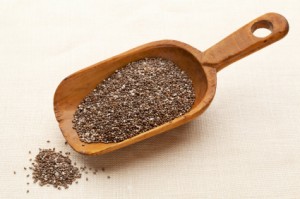 I previously did a post on the many health benefits of chia seeds. In this post I am going to add some additional information to supplement that post by answering a few questions.
I previously did a post on the many health benefits of chia seeds. In this post I am going to add some additional information to supplement that post by answering a few questions.
Is there any difference nutritionally between the white and black chia seeds?
Some online sources have mentioned the white chia seeds are more nutritious than the black but in reality there in no significant difference between the two. A similar situation is with quinoa – The common tan colour and red quinoa are nutritionally similar. Chia seeds can be found in black, white and grey. You will find a mixture of all three when you purchase the black variety. So enjoy whatever colour of chia seed you can get your hands on as long as they are raw and organic.
What’s the difference between typical chia seeds and Salba?
Salba is a specific brand name of chia seeds which are grown in Peru under controlled growing conditions. On the other hand, typical chia seeds are a wild crop that grow throughout Mexico along with Central and South America. These differences in growing conditions result in Salba being more nutritionally consistent compared to typical chia. When compared side by side Salba contains more omega-3 fatty acids and has a higher protein content than typical chia. Typical chia is slightly less nutrient dense overall. Although Salba has a slight edge nutritionally over typical chia both are very healthy foods!
Someone could easily make the argument that the typical chia growing in the wild will be a more hearty crop that has to survive the various environmental conditions. This may produce a more robust crop and seed.
Personally I eat the typical chia seeds which I include in my daily routine.
Do chia seeds contain phytoestrogens?
Yes, chia seeds contain phytoestrogens. They contain plant lignans which are a class of phytoestrogen. The four classes of phytoestrogens are lignans, isoflavones, stilbenes, and coumestans. So far, more than 300 foods have been shown to contain phytoestrogens.
That being said, chia seeds are packed with nutrition and are a healthy addition to anyone’s diet. Eat this superfood on a regular basis to experience its numerous health benefits.
Let me know in the comments whether you prefer typical chia or Salba.
To your health!
Jesse


I prefer the regular chia-Salba a little too pricey. I usually keep both white and black ones. Thanks for clarifying about the seeds!
You’re welcome Anna! Keep enjoying the chia 😉
I adore Chia seeds. They are big discover for my nutrition improvement.
Glad to hear you are pro chia! All the best Julia 😉
I’m not familiar with the chia seed, I am with the flax
seed though. So my question is, how are they eaten?
Do they need to be added to foods, cooked in any
way, or do they come packaged and ready to eat?
I would love that, as I love chewing on any seeds,
flax, sunflower, you name it! I adore their slightly
different flavors but all in all their nuttiness 🙂
Thanks so much for your help,
Ceci
Hey Ceci!
Check out my overview post on chia seeds at https://drjessechappus.com/what-are-chia-seeds/
If you still have any questions feel free to ask away 🙂
I’m glad to hear you are enjoying a variety of seeds!
Have a great weekend!!
Jesse
Actually, chia seeds do indeed contain phytoestrogen to the tune of 32mg per ounce vs. flaxseed 85.5mg per ounce.
https://www.drfuhrman.com/library/cancer_flax.aspx (see footnotes)
Carabella1 – Thanks for the info. The post has been updated with the correct information. All the best!
If both flax and chia seeds contain phytoestrogens, shouldn’t we avoid them? Of course there are nutritional benefits to both seeds, but are the estrogen effects worth it is my question? There are ways to get those beneficial nutrients of these seeds without the phytoestrogens they contain.
_________________________________________________________________________
fitness and self improvement content at http://www.selfimprovedfitness.com
Phytoestrogens are in many foods and supplements and have both pros and cons when it comes to our health. We all need to choose for ourselves how much of these foods to consume deepening on our age, gender, and health goals. Good luck Ahmed!